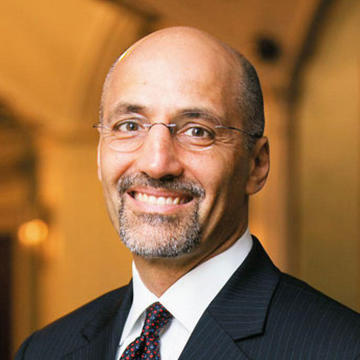From the Director: Testing our democracy
The coronavirus challenge has brought operational changes to every kind of organization
Help support the work of the Miller Center
The COVID-19 crisis is testing the world, our nation, and our government. The crisis is as grand and complex as any world challenge ever—combining elements of past world wars, global financial crises, and natural and humanitarian disasters.
It is also testing the Miller Center. The crisis could not be more relevant to our enduring mission. We study the presidency. We study our democracy. And we engage in public and civil discussion of those issues. We also are adapting as an organization to a new operational reality.
The crisis is testing the presidency. Four years ago, we launched a major project with a core assumption: Presidents need to be prepared for crises. This crisis has tested President Donald Trump as a leader and as a manager. More than the president, it has tested the presidency: the White House staff and the executive branch agencies and authorities that traverse public health, economic and financial markets, diplomacy, homeland security, transportation, and education. It has required the administration to act with Congress with both speed and magnitude to ease the public’s health and economic anxieties.
Our strong and deep bench of scholars are navigating the unsettled policy landscape facing the administration. Our core full-time presidential scholars, our affiliated faculty from throughout the University of Virginia, and our practitioner fellows with government experience in D.C. approach these issues from every angle.
With that in mind, we have launched a robust webinar series that has covered priority executive branch challenges: leadership, pandemic planning and response, national service, healthcare, the economic crisis, the job market, China. (Watch any or all of these discussions here .)
We also have more webinars upcoming, so concerned citizens can participate in interactive discussions with our experts: U.S.-China relations in a turbulent time: Can rivals cooperate? (May 4); The pandemic’s lasting effect on education (May 12); Primaries and primary reform (May 14); and Responding to COVID-19: Federal, state, local (May 21). We have worked closely with other schools and centers across UVA in this effort: Batten, the Center for Politics, the College of Arts & Sciences, Curry, Darden, Law , McIntire, and the Weldon-Cooper Center.
Before the pandemic, our 2019–20 priorities targeted how our government functions:
- the presidency in a constitutional system, with an emphasis on executive powers and the legislature
- the economy, with an emphasis on healthcare and financial crises
- national security, with an emphasis on democracy and on China
- national identity, with an emphasis on immigration and race.
Looking back at those priorities through the lens of the crisis, our team has chosen a steady course and adapted it for an uncertain future.
The crisis will also test our democracy. Beyond the executive branch, we are working with partners across UVA to address questions facing the institutions and practices of a free society.
Will our electoral system—especially during a presidential election—be able to hold a free and fair vote?
Will the media—traditional and new platforms—be able to deliver timely and trusted information?
How do we ensure equal opportunity, particularly as unemployment skyrockets and public schools shut down? How do we protect and serve all our citizens equally in a life-or-death moment?
How do we work with foreign governments, democratic and non-democratic, in fighting the virus and its spread? Will the pandemic take a toll on democratic governance itself?
The pandemic has touched nearly every nation on Earth and has already put 30 million Americans out of work. The long-term implications will challenge every part of our democracy for many years to come.
The crisis will test our ability to deliver rigorous public and civil discussion. We all are learning how to work in an entirely new environment. The cozy confines of our Forum Room—which many of you cherish for our weekly events—were not designed for social distancing.
Our scholars and staff moved quickly in early March, prioritizing the safety of our local community. We repurposed many spring events into webinars. Other events are being rescheduled for the fall semester (staying vigilant of the safety of all concerned). We sincerely thank our regular and faithful patrons who have quickly adjusted to the new online reality and who continue to support our efforts. Indeed, our webinars are growing an online following.
Working with the wider UVA community, we have helped others take advantage of these new technologies, reaching new audiences together.
Finally, the crisis will test our organization. The pandemic is testing us all. Working remotely has not been easy. And we all are mindful of the devastating toll on the country and the world.
There is reason for hope. We began this crisis as a healthy organization, fiscally and culturally. We have worked hard in recent years to build a supportive and respectful workforce and Governing Council, all committed to living a set of core values . That effort has paid off in this moment. Our team has come together and risen to this occasion. As important, the Miller Center sees its mission as serving others—working with groups across the UVA and Charlottesville communities and developing opportunities for students whose plans have been disrupted. I am deeply appreciative of everyone in our organization who has given us a chance to succeed.
In the words of our late, great friend Jim Lehrer: “Onward.”
